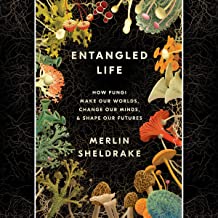Entangled Life: How Fungi Make Our Worlds, Change Our Minds, and Shape Our Future by Merlin Sheldrake 2020
In reading this book, that old expression “Give a man a hammer, and the whole world is a nail” came to mind. Sheldrake is enthusiastic, well-informed, and exhausting in his excitement about fungi of all kinds and forms, and he does make the case that is stated in the title. Fungi do appear to be one of the main architects of our planet, largely responsible for the decomposition of the dead organisms that would be piling up all around us in their absence. They also are the leading characters in altering our mental states with psilocybin derived from mushrooms taking center stage in exciting new research in PTSD, depression, alcoholism and other areas. And fungi may well be a major player in reclaiming our future planet both as key elements in the ‘wood wide web’ of carbon dioxide removing trees and as active agents in remediating polluted areas.
My problem was that he’s way overly enthusiastic. I found the endless statistics to be overdone and his excitement to be a bit over the top. Yes, fungi are important and yes, they’ve been neglected as science has focused on plants and animals, but did we really need details enough to fill a 26 page index, a 48 page bibliography, and 51 pages of footnotes? Also, I couldn’t stop visualizing Merlin Sheldrake as some kind of fungus wizard complete with wand and conical hat. On the other hand, the book is enthusiastically blurbed by some very high-powered science writers including Ed Yong, Michael Pollen, Elizabeth Kolbert, and Robert Macfarlane, all of whose work I have enjoyed and respected. In addition, it won a bunch of book awards and was positively reviewed in Britain, so maybe it’s just me.
Perhaps the most interesting part of the book is when Sheldrake brings fungus into the current thinking about self-organizing biological systems and complex adaptive systems. He compares a mycelial network that connects and is vital for the health of forest systems (the largest one in Oregon stretches for several square miles) to the internet, airline hub-and-spoke systems, and even the human brain. All of these systems appear to be fundamental for the exchanges of information and energy that are critical for life on earth. That was interesting!
In an epilogue entitled ‘This Compost’, Sheldrake describes how he took copies of his book, introduced them to fungi, and used them as the substrate for growing oyster mushrooms and making beer, which he then ate and drank. That might be a solution for what to do with my ever-expanding library that threatens to engulf our home. I did learn quite a bit about fungus and their critical role in the biology of our planet from is book, and that was worth doing, but I’m still primarily interested in them, however, as something delicious to eat.



